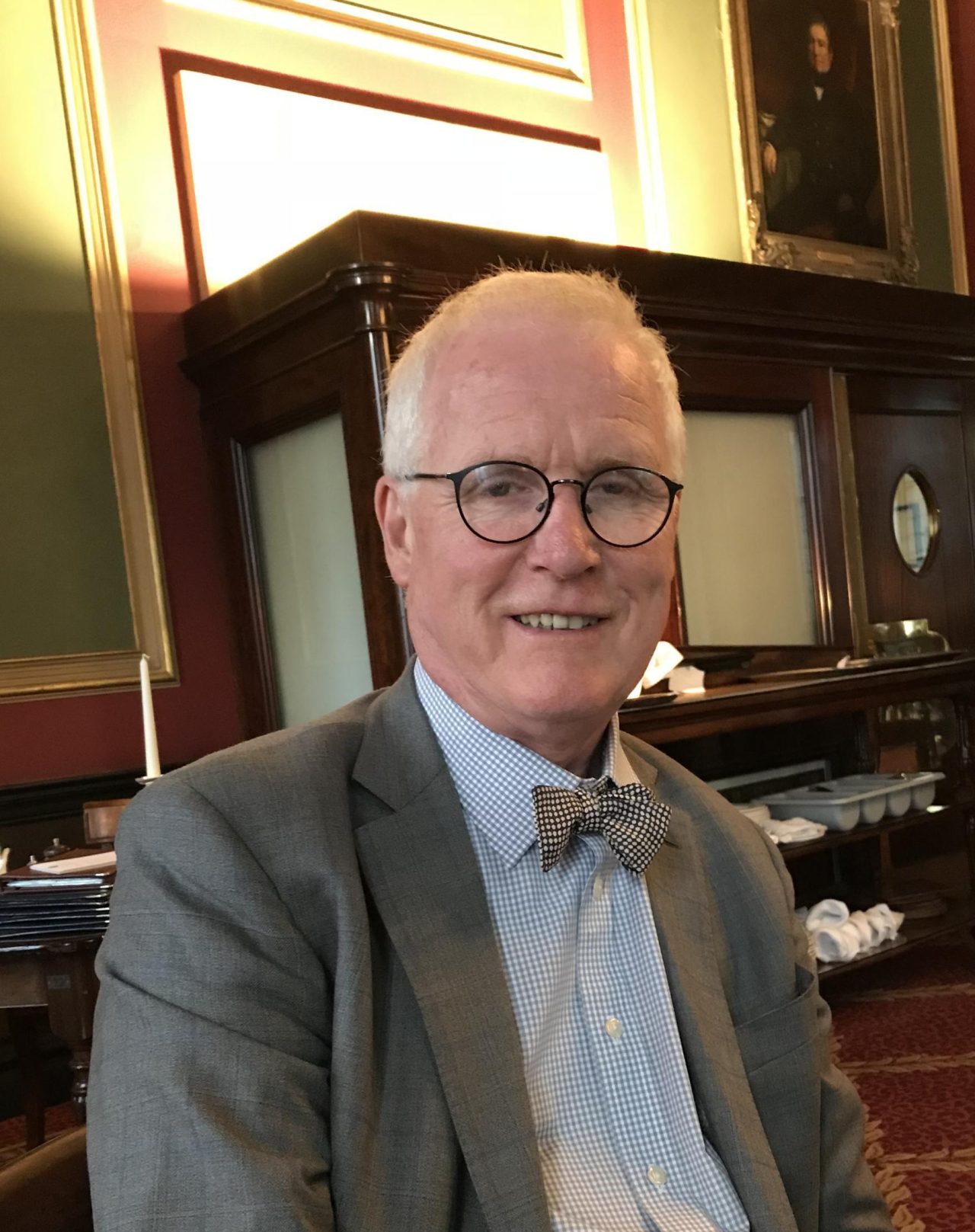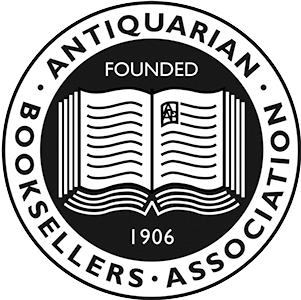ABA News
Rob Shepherd (1952 - 2022)

‘A great man, a true gent’.
These phrases were repeated so often in the many messages received after Rob Shepherd’s untimely death and are testament to the influence this extraordinary man had in the world of books and bookbinding, and the warm respect which he commanded.
Rob had kept his illness very private, with only his very closest family aware of the seriousness of the cancer he was suffering from. He wanted no fuss or sympathy and with customary dedication in his final weeks was still working on company finances. He bore his illness with bravery and complete discretion and maintained a passionate interest in the business he set up 34 years ago, to the very end.
Rob was born above a pub in Windsor where his father was landlord but spent his childhood in Plymouth when the family moved there. He began his career as a bookbinder after studying Fine Art at West Surrey College, and whilst spending his days as a van driver transporting prosthetic limbs around the country, he started an evening class in bookbinding at Camberwell College of Arts. He had started buying a ‘motley collection of cloth and leather-bound books’ from junk shops, and after just a few weeks of classes, with some chutzpah he introduced himself as a bookbinder to antiquarian book sellers Sims and Reed in St. James’s and started repairing books for them at his classes and at home. As he said, he must have been doing something right as they kept giving him more work.
Rob was good friends with Clapham neighbours and art booksellers, Thomas and Shaunagh Heneage, and in 1988 they set up Shepherds Bookbinders in Rochester Row, in London’s Pimlico. It was a big step up but after a somewhat challenging year teaching art in a girls’ school in Battersea, Rob fervently knew it was bookbinding he wanted to do, and enough work was coming in from booksellers to make a living from it. He soon employed a couple of part-time bookbinders, and Janet Atkinson joined the company from the College of Arms as a paper conservator. Restoration work came in from antiquarian booksellers, bibliophiles and livery companies, as it still does to this day.
Rochester Row was a good location for passing trade, and customers were soon requesting new bindings and boxes. Rob wanted to offer a wider range of materials for customers to choose from and thus began selling papers and bookbinding materials. Papers were a particular passion of his and this aspect of the business expanded hugely when his sense of entrepreneurship instigated the purchase of Falkiner Fine Papers in 2003, a veritable cathedral of fine papers in Southampton Row, which moved to new premises in Gillingham Street, not far from the bindery, in 2011. The design of the new shop with 700 shelves of papers and a counter of solid oak was Rob’s brainchild and it continues to be a destination shop for many artists, designers, bookbinders and anyone with a love for stationery.
Some years before this, the bindery had also undergone a huge expansion, when Shepherds purchased the venerable bookbinding companies Sangorski & Sutcliffe and Zaehnsdorf, from Asprey. With customary vision, Rob had first approached Asprey about selling SSZ to Shepherds in the early nineties. With Chairman David Cooper’s financial and legal clout, after some years of negotiations the deal was done, and in 1998 Shepherds small binding team moved to Great Guildford Street to join forces with the crafts men and women from SSZ.
During the takeover of SSZ Rob made an extraordinary discovery in the old SSZ workshop in Bermondsey Street. Stashed away in a cupboard were the untouched archives of Sangorski & Sutcliffe, brought over from their old workshop in Poland Street in 1988 when Asprey had bought them to join forces with Zaehnsdorf. This fuelled Rob’s fascination for S&S - an artisanal bookbinding company from the Edwardian age making highly decorative jewelled bindings - and resulted in him writing two books about the company. In 2001 he published ‘Lost on The Titanic’, the story of ‘’The Great Omar’ , a binding with over 1000 jewels intricately decorated with leather onlays and delicate gold tooling, and its tragic journey to the bottom of the Arctic Ocean. The book was published as a limited edition and is still collected today.
His second book, ‘The Cinderella of the Arts’ was published in 2015 by Oak Knoll Press and is a more detailed history of Sangorski & Sutcliffe. The title alludes to Rob’s passion for trade bookbinding – the crafts men and women of the old trade binderies would work as teams to create the highest quality bindings - but their knowledge and skills went unrecognised in the world of arts and crafts. Where machines took over mass production of books in the 20th century, and speed and economy denigrated the craft, a scattering of bookbinding companies remained who practised the tried and tested centuries old methods of bookbinding. With the modern archival materials Rob sought out from across the globe, the ethos of Shepherds bindery was to combine the ancient with the modern, and the integrity of the production process was always of paramount importance.
Both to celebrate the skills of the bindery, and to fulfil his established interest in collecting and selling books, Rob set up a dedicated book store in Curzon Street, Mayfair, stocked with an eclectic mix of first or limited edition titles. The integrity of the book was always central to how it was sold: books, perfect or near perfect in their original bindings, were left alone or boxed for protection; those needing repair were restored; and those which had long lost their original protection would be given a new cover in either period or contemporary style to complement the content.
These heritage skills, showcased in Curzon Street, were disappearing however. College courses and apprenticeships in craft bookbinding had all but disappeared,
and the craft was losing its skilled trade binders. In the 1990s Rob had produced a video and book on elementary bookbinding, which was aimed at amateur bookbinders working from their kitchen tables, but he knew more was needed. With the demise of the HND course in bookbinding at London College of Printing in the early noughties, he instigated new courses in bookbinding at Great Guildford Street, covering beginners bookbinding to box-making, gold finishing and restoration. These courses were taught by some of the finest in the business: Eri Funazaki, Dan Wray, and Glenn Bartley to name a few. It was essential for the craft that these courses should have international recognition, however, and his next step was to devise bookbinding qualifications with City & Guilds, and in 2013 Shepherds became a registered centre for City & Guilds.
The C&G courses were transferred to the Daffodil Barn in Wiltshire, Shepherds rural bindery with dedicated teaching room, which had been set up after the bindery team moved out of Great Guildford Street and back to Rochester Row in 2008. It was in the barn that Rob first met and befriended Jonathan Powell, a Lieutenant Colonel in the Royal Welsh working at army headquarters in Wilton, who had taken up bookbinding and attended a course or two at the barn. After discussing the therapeutic benefits of the craft, the pair came up with the idea for a charity offering bookbinding to wounded, injured and sick veterans who had been discharged from the services, and in 2012 Bound by Veterans was born. BBV not only offered bookbinding as a therapeutic activity, greatly beneficial to those with stress-related illnesses in particular, but the C&G qualifications offered by Shepherds were useful to veterans transitioning out of the services.
It was soon after this that the clerk of the Worshipful Company of Stationers and Newspapermakers, William Alden, put Royal Librarian Oliver Urquhart Irvine in touch with Rob, who had been a liveryman of the Guild for some years. Oliver had been concerned about the impending retirement of the head binder in the Royal Bindery and the lack of apprentices to train in his place. Conversations led to meetings with interested parties and The Queen’s Bindery Apprenticeship scheme (QBAS) was launched in 2016. The scheme was supported by eight founding partners including the Antiquarian Booksellers’ Association, of which Rob was member and Treasurer for many years, and three skills and industries partners, of which Shepherds was one. Its structure was based around the C&G qualifications which now included a Level 3 Diploma, to be taken over a period of three years, with two further years of work experience in a variety of institutions and bookbinding businesses. This 5 year apprenticeship was a throwback to the trade apprenticeships of old and over three years a total of 6 apprentices were engaged at Windsor, before the scheme fell victim to covid lockdowns in 2020.
Despite this, the scheme was seen as a huge success and established a structure for formally training apprentices in the heritage skills of craft bookbinding, and Rob used it as leverage in acquiring government recognition for bookbinding apprenticeships in accordance with the requirements of the Department of Enterprise, Trade and Investment. He worked long and hard to get the apprenticeship standard through the complex demands of DETI and his success in doing so was an important milestone. The recognition he brought to craft bookbinding as a heritage skill which should be preserved, and the training mechanisms he instigated are one of his greatest legacies.
Books and bookbinding were not everything, however. Rob would say his greatest legacy is Max, his son with first wife Di, who said at the funeral that losing his dad was like losing ‘his best friend’. Rob is also survived by Maria Scott, his long-term partner whom he quietly wed in March of this year, and his brother Phil. Illness took its vicious hold just as he was passing on the reins of Shepherds to me, and his retirement plan to do a little book dealing, paint watercolours, and tour Scotland with Maria and his beloved Norfolk Terrier Bertie was tragically never to be.
Rob made friends in whatever sphere he moved, local or global. The greatest of company, with many a story and anecdote told over a very good glass of wine (he would never tolerate anything less), he could also be tough and uncompromising when riled; but knowing him meant knowing he was a man with a kind heart, a man of the greatest integrity who would do anything to help those who needed it. The respect he commanded was lightly worn, and he would be the last person to take credit for any of his many achievements. He is greatly missed by all who knew him.
- Ali Strachan, Shepherds Bookbinders
